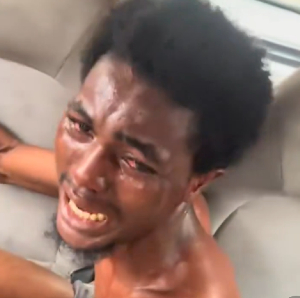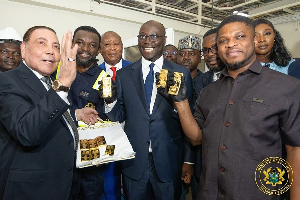By Kwame Okoampa-Ahoofe, Jr., Ph.D.
Garden City, New York
Feb. 14, 2015
E-mail: okoampaahoofe@optimum.net
When I left the faux-revolution-blighted shores of Ghana in July 1985, the country's economy had totally ground to a halt. One did not need to have obtained an undergraduate degree in economics from any one of the then-three universities in the country to fully appreciate the utter hopelessness of the situation. Suicide was at an all-time high, largely inspired by the desperate economic situation in the country. The media reportage of such incidents of the decidedly tabooed, at least as I had known it growing up among the majority Akan people of the country, was largely focused on dwellers of our cities and large towns. And I am not certain whether any government or public agency or institution kept any count in those dog days. In all likelihood, rural dwellers bore the sharpest brunt of the dire economic straits. Scarcely four years before, the democratically elected Limann-led People's National Party (PNP) had been senselessly overthrown, in the dubious name of "revolution," by the Rawlings-led Provisional National Defense Council (PNDC).
In 1985, the then-retired Airforce flight-lieutenant, at 37 years old, was all pontifical about the prophetic fact of him having promised that if his erudite and mild-mannered sucessor, Dr. Hilla (Babini) Limann, was envisaged to be misruling the country, Mr. Jerry John Rawlings, the real owner of Ghana, would promptly step in to set things aright. Well, as the economic mavens of the Institute of Economic Affairs (IEA), one of the country's foremost think tanks, tell it (of course, in 1985, there were no privately and independently operated think tanks in the country; most fairly well-educated Ghanaians did not even know what a think tank was), barely two years after the self-righteous PNDC leader returned himself to power, "By 1983," that is, "Ghana's economy was [eerily and clearly] on the brink of [total] collapse, due [largely] to its huge national debt and high fiscal deficits. The national debt had reached a catastrophic level of 107.5-percent of GDP."
In other words, the country and its bumbling leadership were borrowing and spending more than they were producing and thus were practically insolvent, in the analgesic language of economics experts. Anyway, the IEA report continues: "Inflation was 142-percent, and the commercial banks had stopped lending to commercial enterprises. The economy was teetering on a precipice of complete collapse" (See "Ghana Retrogressing - IEA Warns" MyJoyOnline.com / Ghanaweb.com 2/14/15). Of course, most of the damage wreaked upon the country's fragile economy by the time that Dr. Limann and his People's National Party assumed reins of governance in late September 1979, had been done by Ghana's military rulers, primarily the Acheampong and Akuffo-led National Redemption Council (NRC) and later Supreme Military Council(s) I and II.
The real culprits or nation wreckers, of course, governed at the very beginning of the country's reassertion of its sovereignty from British colonial rule; I am hereby, of course, referring to the Nkrumah-led regime of the so-called Convention People's Party (CPP). By 1961, that is barely four years into the postcolonial era, Ghana had gone from a promising West African economic power to total bankruptcy and economic receivership (See Frimpong-Ansah's The Vampire State in Africa). This was the reality of the economic climate into which the democratically elected Busia-led Progress Party (PP) had been ushered at the close of 1969. The Ankrah-, Kotoka- and later Afrifa-led National Liberation Council (NLC) putschists who auspiciously overthrew the Nkrumah regime had, of course, also done their own bit of wanton economic mismanagement.
The fact of the matter, however, is that burdensome debt and all, the brutally and invidiously slain Gen. Ignatius Kutu Acheampong had had much to show for his decidedly "benign" 6-year dictatorship, one that had been far more liberal than the Nkrumah-led one-party regime of the so-called Convention People's Party (CPP). The irony here, though, is that while he had actively participated in the landmark and auspicious overthrow of the CPP, as a bona fide member of the National Liberation Council, having also served as a regional commissioner, nevertheless, in 1972, shortly after overthrowing the Busia-led Progress Party, the then-Col. Acheampong had grown a quaint fondness for the clinically lunatic and autocratic leader of the CPP (See Mahoney's JFK: The Africa Ordeal) to the damnable extent of having even entertained the quixotic idea of returning the then exiled, ailing and aging dictator to the helm of the country's affairs. Fortunately, Divine Providence appears to have promptly and opportunely intervened to save Ghanaians from another excruciating experience in Dante Allighieri's apocalyptic Systems of Hell.
What we learn from the IEA press release, cited above, is that most of Ghana's last three decades has witnessed the reckless and mindless and systemic destruction of the country's economy by former President Jerry John Rawlings and leaders recruited by the latter, whose wanton profligacy, largely in the form of expediently misappropriating the financial resources of the country to further their individual and cabalistic political ambitions, rather than focusing our resources on the development of the country and the upliftment of the most impoverished and vulnerable among us from abject economic deprivation.
In thirty years, the IEA tells us, the Rawlings Posse of criminal political profiteers has taken Ghana to the much-maligned and resented IMF-World Bank's economic conditionalities three times, compared to President John Agyekum-Kufuor's one time Pick-After-Rawlings HIPC program. The implicit conclusion here, of course, is that Ghana has been perennially and consistently ruled by its least talented, foresighted and civically responsible citizens. And so it is not clear just how Dr. Akwetey's group of think-tankers expects Ghanaians to pressure our parliamentary representatives to adopt "fiscal policy rules with ceilings on annual fiscal deficits."
In other words, the IEA expert economists would have Ghanaians write into law limits on the highest extent to which any government in power may be allowed to borrow and spend, as a means of ensuring progressive and sound fiscal discipline, the way it is practiced in such relatively advanced economies as Brazil, Chile, the United States of America and the European Union countries. Good luck!
____________________________________________________________
Opinions of Wednesday, 18 February 2015
Columnist: Okoampa-Ahoofe, Kwame














